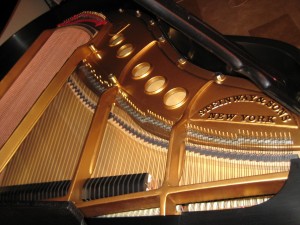 There are several points to consider when looking for a quality instrument.
There are several points to consider when looking for a quality instrument.
- Most musicians are concerned, naturally, about the tone, or sound quality of the piano.
- Also high on the list for most pianists is touch, or how the piano feels and responds.
- Of significant importance is how the piano will hold up under use, and how long it will last. We have chosen the word durability to describe those qualities.
- In addition to the musical qualities of the piano, most people are more or less interested in its appearance, i.e. looks, finish, style, color, sheen, shape, etc.
- How well the manufacturer built the piano and what quality it was designed to have.
- Finally, one of the most important considerations is cost: this includes such considerations as the piano’s price, your available budget, financing options, investment value of the piano, resale value, etc.
When you consult certain piano manufacturers’ ads, web sites, or promotional materials, they will often offer a list of the things they think should be of importance when you buy a piano. They may list some of the above points, but also add several of their own that usually tend to direct you towards their particular brand of piano. You need to understand the some universal things about touch, tone, quality, durability and appearance. When applied to two pianos you are comparing, it can help you understand the similarities and differences between them, without being partial to any particular brand.
Much of the time the difficulty for the novice piano buyer is in knowing whether a particular piano’s sound, touch, durability, looks, or even price, is good. As making these kinds of judgements can require years of training, many people enlist the help of someone who they feel has more experience than themselves: a pianist, piano teacher, or piano technician (or tuner). And then there are those who just trust the salesperson.
For many people, including a lot of accomplished pianists, it can be difficult to separate the touch of an instrument from its tone. If the touch of a piano is such that it is difficult to produce a good tone (or if the action “gets in the way” of producing a good tone), many folks will assume the piano has a poor tone inherently, because they won’t be able to achieve it easily or at all, based on their level of piano skills. So unfortunately, many pianos that have a good tone but just need some touch adjustments or repairs are routinely passed by. In the same way a piano can have a good touch, but the tone-producing parts (such as strings or soundboard, etc.), may need adjustments or attention. Since the touch still results in a poor tone, people will assume automatically that the touch is faulty too.
Credit: http://www.pianofinders.com/educational/shortguide.htm
